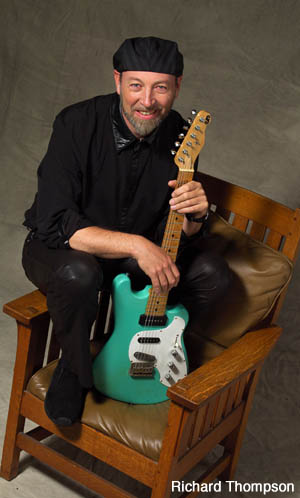Rock of the Ages
Richard Thompson Takes One Step Back, Two Steps Forward

If waltzing one’s way through the previous thousand years of popular music wasn’t a daunting enough prospect, being a significant part of the next musical era surely must be. But if anyone can pull it off, Richard Thompson can. The last time the English virtuoso passed through Santa Barbara, he led us on an adventure that started with a traditional English round, ended with Britney Spears, and visited every popular musical movement in between. And while Thompson’s acoustic show this Wednesday night won’t exactly be “out with the old,” it will certainly be “in with the new”-millennium, that is.
Since your last visit, you seem to have switched from the big sound of 1000 Years of Popular Music to a pared-down acoustic vibe. Do you think each project’s success depends on an artist doing something different with his or her music? I think so. If you look at popular music, there is a lot of recycling that has gone on in the last 40 years. Sometimes you have to explore historical music forms or explore the different roles music has played in other cultures to hear different ideas. It’s a very enriching thing because some of that music is extraordinary and it just gets lost in the dust of history.
How much of that exploration has sifted into your own music? Are you finding 16th century Italian dance riffs or Tall Ship influences in your new stuff? Well, strangely enough, yes! I do notice I think harmonically different sometimes and thematically things are certainly different, too. And even song structures are different. Instead of thinking verse-chorus-verse-chorus, I find myself thinking about what the troubadours would have done in the 12th century!
Speaking of your latest compositions, one particular song, “Dad’s Gonna Kill Me”-“Dad” being slang for Baghdad-from your forthcoming album Sweet Warrior, has already generated hefty Internet discussion. Any thoughts on that? Well, songs resonate in different markets. This is a song from the soldier’s viewpoint and it’s kind of ambiguous as to whether it’s pro- or anti-war. But it is a political song and therefore it’s probably reaching across a wider spectrum.
The song offers a very unique perspective. It is not so much a statement as a presentation of a view. I don’t think I’m interested in making a statement in that way. What interests me is the language soldiers use. From Elizabethan times through 19th-century sailors and even World War II, I have always found jargon really interesting. And there has been some interesting slang that has come out of the Iraq War. It occurred to me it would be intriguing to write a song using a lot of that slang to express the soldier’s point of view.
Is the language a reflection of the soldier’s lack of superficiality? Soldiers cut to the quick. They tend to cut through the bullshit of the generals and the politicians and tell it like it is. And there is usually a kind of sardonic humor and world weariness to it.
Your songs often involve characters and situations far removed from California life. Living in L.A., why don’t your immediate surroundings find their way into your narrative? I think the landscape the songs get set in is kind of an internal one. It depends upon the kind of artist you are. I tend to place characters in certain settings. I could probably write about a situation in California, but set it on a lonely moor somewhere with a Bront»-like bleakness. But, who knows about the future; perhaps I’ll do a Jan and Dean album.
4•1•1
Sings Like Hell presents Richard Thompson this Wednesday, March 14, at Lobero Theatre at 8 p.m. For tickets, call 963-0761.



